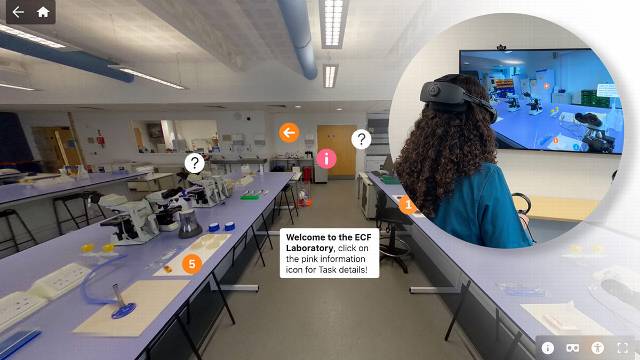
A Harper Adams alumnus has set up an independent news website aimed at helping the food and farming industries understand the changing face of agriculture.
Gary Hartley, who studied for an MSc in Entomology at the University in 2018-19, set up Farming Future Food to address a gap he and his colleague saw in the media.
The site aims to provide independent news, linking farmers to the technological and research innovations they need to help their farms take advantage of the latest developments in the sector in a practical fashion and sharing scientific research to the audiences it needs to reach.

Gary said: “I’ve known my Farming Future Food co-editor, agricultural journalist Caroline Stocks, for many years, and when I finished my Masters in Entomology at Harper Adams, we started talking about ways our interests could combine.
“We’re both really interested in communicating agricultural science, particularly around agri-tech and sustainable approaches to food production, and we found ourselves having lots of discussions about what works, what doesn’t, and what’s missing.
“We identified a gap in terms of explaining agri-tech science in a way that’s simple and clear for producers, policy makers and investors, and decided that we should have a go at filling that gap ourselves.”
Gary and Caroline’s site may primarily be a resource for farmers – but as they develop, they are hoping to also become a place where industry and innovators will showcase their work to potential customers and explain the impact that their new products can have.
However, Gary remains keen to stress that the independence of the site will remain at its heart.
He added: “We want Farming Future Food to become a hub for anyone who is looking to learn about the latest agri-science in a clear and simple way.
“Our target readers are anyone from farmers who want to understand how investing in technology could help their operations, through to entrepreneurs who want to get their products and ideas seen by those who might use them.
“We’re looking to create relationships with companies and research partners who share our goals and are interested in exploring different ways of sharing information about research and new technologies.
“Because both Caroline and I have backgrounds in communications we enjoy finding creative ways of sharing information, and we know there are great stories to be told around agri-tech and agricultural science.
“We’d love to be sent ideas for articles, but we’re also looking for evidence-based stories that are meaningful and useful for farmers - we don’t want Farming Future Food to be yet another agri-tech site that just talks about investments or product launches.”
While some readers might think it odd for an entomologist to talk about agri-tech products, Gary believes the broad grounding he received in his Harper Adams MSc sharpened the transferable skills which he now draws on in writing news pieces.
He added: “During my time at Harper Adams, I got a real crash course in how to critically analyse scientific literature, something that certainly helps as I look for undiscovered research gems to cover on the site.
“Despite doing a masters in what would seem like a very niche area - Entomology - in reality, the course gave me a grounding in far more than bugs; it also gave me a detailed understanding of agro-ecology, growing practices and how ideas about pest control and pollination fit within an industry context.
“I also take a lot of inspiration from the late Professor Simon Leather, who was very focused on trying to communicate science in as accessible and meaningful way as possible.”
Indeed, Gary’s work on his site aims to emulate Professor Leather’s work in making detailed scientific research more easily accessible beyond academia – and getting the stories that matter to the people who need to see them
He added: “Despite a lot of talk of the importance of ‘Sci Comm’, so many of the old problems remain.
“All too often research that has the potential to be of interest to a wide audience is only seen by a handful of other academics.
“This is especially true of agri-science, which isn’t seen as being particularly glamorous and is woefully underserved by the mainstream and scientific media.
“This is such a loss to the general public, as knowledge about how our food is produced has never been more vital. We’re hoping to tell the stories that might otherwise get missed and bring them to life for as many people as possible.
“When it comes to the way agricultural innovation is reported on, there tends to be a lot of coverage on initial investments, but little detail on the outcomes.
“We want to change that by making agri-science as relevant and accessible as possible to the people who would stand to gain from new technologies and approaches.”
The Farming Future Food website can be found here.
 Blog: Veterinary Medicine students step into immersive 360° laboratory
At Harper & Keele Veterinary School, students are stepping beyond the traditional microbiology bench and into an immersive 360° labo …
Posted
Yesterday
Blog: Veterinary Medicine students step into immersive 360° laboratory
At Harper & Keele Veterinary School, students are stepping beyond the traditional microbiology bench and into an immersive 360° labo …
Posted
Yesterday






